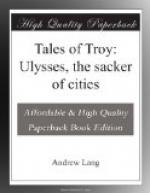“No,” said Diomede, “if I spare your life you may come spying again,” and he drew his sword and smote off the head of Dolon. They hid his cap and bow and spear where they could find them easily, and marked the spot, and went through the night to the dark camp of King Rhesus, who had no watch-fire and no guards. Then Diomede silently stabbed each sleeping man to the heart, and Ulysses seized the dead by the feet and threw them aside lest they should frighten the horses, which had never been in battle, and would shy if they were led over the bodies of dead men. Last of all Diomede killed King Rhesus, and Ulysses led forth his horses, beating them with his bow, for he had forgotten to take the whip from the chariot. Then Ulysses and Diomede leaped on the backs of the horses, as they had not time to bring away the chariot, and they galloped to the ships, stopping to pick up the spear, and bow, and cap of Dolon. They rode to the princes, who welcomed them, and all laughed for glee when they saw the white horses and heard that King Rhesus was dead, for they guessed that all his army would now go home to Thrace. This they must have done, for we never hear of them in the battles that followed, so Ulysses and Diomede deprived the Trojans of thousands of men. The other princes went to bed in good spirits, but Ulysses and Diomede took a swim in the sea, and then went into hot baths, and so to breakfast, for rosy-fingered Dawn was coming up the sky.
BATTLE AT THE SHIPS
With dawn Agamemnon awoke, and fear had gone out of his heart. He put on his armour, and arrayed the chiefs on foot in front of their chariots, and behind them came the spearmen, with the bowmen and slingers on the wings of the army. Then a great black cloud spread over the sky, and red was the rain that fell from it. The Trojans gathered on a height in the plain, and Hector, shining in armour, went here and there, in front and rear, like a star that now gleams forth and now is hidden in a cloud.
The armies rushed on each other and hewed each other down, as reapers cut their way through a field of tall corn. Neither side gave ground, though the helmets of the bravest Trojans might be seen deep in the ranks of the Greeks; and the swords of the bravest Greeks rose and fell in the ranks of the Trojans, and all the while the arrows showered like rain. But at noon-day, when the weary woodman rests from cutting trees, and takes his dinner in the quiet hills, the Greeks of the first line made a charge, Agamemnon




